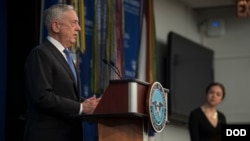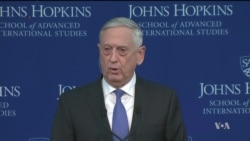On Friday, ahead of his trip this weekend to Asia, U.S. Defense Secretary Jim Mattis unveiled a major shift in U.S. defense priorities.
"We will continue to prosecute the campaign against terrorists that we're engaged in today, but great power competition, not terrorism, is now the primary focus of U.S. national security," Mattis said during a speech in Washington.
The U.S. defense chief was rolling out the Trump administration's National Defense Strategy (NDS), a report that specifically cites "growing threats" posed by China and Russia.
The NDS noted China is using "predatory economics" to intimidate its neighbors, while "militarizing features in the South China Sea."
Mattis' trip will take him to Indonesia and Vietnam, two countries that have taken a bolder stance – including modernizing their militaries – to push back on China's disputed territorial claims in the sea.
Vietnam, in particular, is an increasingly important U.S. partner in the region.
"Vietnam is not an ally of the U.S. – it has a defense policy of no alliances, no bases in the country, no ganging up against a third party. So we'll have to see where it goes," said Carl Thayer, an emeritus professor specializing in Southeast Asia at UNSW Canberra. "But its military modernization has made it very robust."
But Mattis' trip could also focus on more immediate priorities in the region, including putting more pressure on North Korea and dealing with the hundreds of Islamic State fighters returning to Southeast Asia from Iraq and Syria.
A reminder that, even though long-term defense priorities may be changing, old problems don't appear to be going away.






